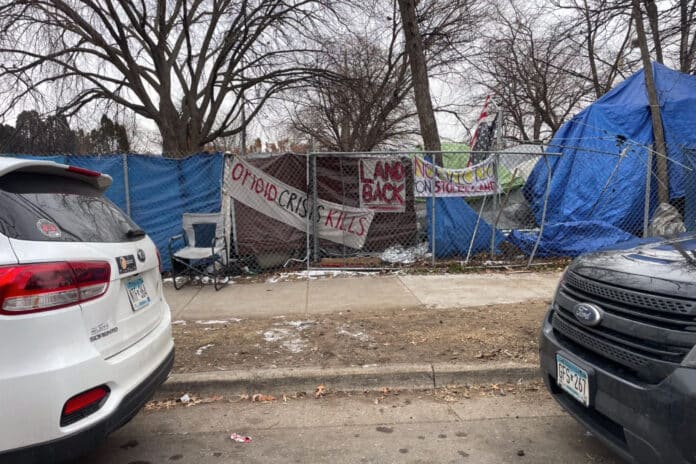
A last-minute lawsuit filed by residents of a south Minneapolis homeless encampment came up short, clearing the way for the city to move forward with its scheduled eviction Thursday.
U.S. District Court Judge Eric Tostrud declined to issue a temporary restraining order Wednesday that would have prevented the city from clearing the encampment at East 23rd Street and 13th Avenue South. That decision came in response to a lawsuit filed by the Climate Defense Project on behalf of encampment residents, who accused the city of violating their constitutional rights.
The encampment, which has occupied a city-owned lot since August, has become a public safety and health hazard, the city said in a press release. Multiple shootings and other crimes have occurred at the encampment, which organizers describe as a “community-based healing camp rooted in Native religious and cultural practices.”
JUST IN: Crews are putting out a fire as police prepare to evict a south Minneapolis homeless encampment known as Camp Nenookaasi. pic.twitter.com/rDaPe4kqQE
— Alpha News (@AlphaNewsMN) January 4, 2024
“We are the most forgotten and marginalized people in the entire country,” Sam Strong, the secretary for Red Lake Nation, said during a press conference calling for a halt to the eviction. He said the city needs to work together with the camp to build a healing center to house the approximately 150 individuals who live there.
Minneapolis City Council Member Jason Chavez was also present, expressing his disagreement with the eviction. During the press conference, he criticized the city for not providing storage bins for the camp residents to pack their belongings.
Other elected officials in attendance included Council Member Elliott Payne and Minnesota Rep. Aisha Gomez.
One woman is considered to be the “grandmother” of the camp. Nicole Mason founded Camp Nenookaasi and moved to live in the camp too, she explained. She said Native Americans want their land back and resources from the government. “That’s what we are demanding here,” Mason said.
Mason also acknowledged the addiction issues present at the camp. “Addiction is a grieving process,” she said, attributing the problem to “generational trauma.”
More than 30 Minneapolis Police Department vehicles filled the streets surrounding the camp beginning around 11:30 a.m., with officers blocking streets for blocks around it.
One of the structures inside the camp caught fire during the move-out process and Minneapolis firefighters were called in to assist. The fire department had to cut through a chain-link fence and pull down a wall made of wooden pallets to gain access to the fire.
More video: pic.twitter.com/vDstyvpKAy
— Alpha News (@AlphaNewsMN) January 4, 2024
The residents of the homeless encampment were slowly moving their belongings Thursday afternoon and taking down tents and yurts, some of which were moved to a new empty lot just a few blocks from the original location. A picture posted by Crime Watch Minneapolis shows that the encampment was moved to a lot at 26th Street and 14th Avenue South.
3/
They've reportedly broken through a fenced lot at 26th and 14th Ave S and are setting up camp. pic.twitter.com/oycW7fIfHI— CrimeWatchMpls (@CrimeWatchMpls) January 4, 2024
“We deserve to recover — land back,” one sign read that was posted near the entrance to the camp. Residents were also flying a tattered American flag upside down, with writing on it that said “Wall of Forgotten Natives,” a tribute to a homeless encampment that was evicted in August.










